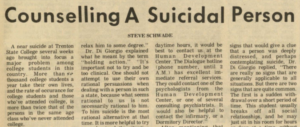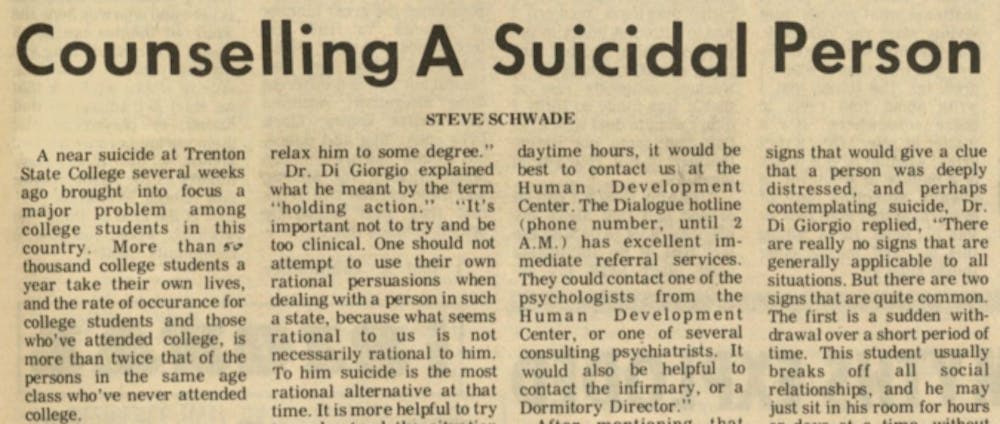Suicide is a concern that is unfortunately all too prevalent, especially in the lives of young people. Suicide is the 10th leading cause of death in the U.S., according to the American Foundation for Suicide Prevention. In 1973, a suicide attempt at the College brought the issue to the forefront of the campus community.

A near suicide at Trenton State College several weeks ago brought into focus a major problem among college students in this country. More than 50 thousand college students a year take their own lives, and the rate of occurrence for college students and those who've attended college is more than twice that of the persons in the same age class who've never attended college.
In order to gain some insight into this startling problem, Dr. Tony Di Giorgio of the Human Development Center was asked what a person should say or do when dealing with an individual who is intent on self-destruction.
"The two main things to remember are to, first, remain calm, and second, to maintain some type of 'holding action.' Words aren't terribly important. They get in the way when they communicate anxiety and apprehension. Your own excitement and agitation is transferred to the suicidal person. When you are calm and unexcited it tends to relax him to some degree."
Dr. Di Giorgio explained what he meant by the term "holding action." "It's important not to try and be too clinical. One should not attempt to use their own rational persuasions when dealing with a person in such a state, because what seems rational to us is not necessarily rational to him. To him suicide is the most rational alternative at that time. It is more helpful to try to understand the situation from his perspective. By trying to understand what is going through this person's head, you show him that you are concerned, and this can do more for him than any rational arguments.
"It is also important not to appear that you are judging or evaluating the suicidal person in any way. For example, by telling him that it's stupid to kill himself, you are in effect, telling him that he is stupid. This is just adding to his own negative view of himself, and adding to his own self-devaluation.”
Dr. Di Giorgio was asked who could be contacted in such an emergency. "During daytime hours, it would be best to contact us at the Human Development Center. The Dialogue hotline (phone number, until 2 A.M.) has excellent immediate referral services. They could contact one of the psychologists from the Human Development Center, or one of several consulting psychiatrists. It would also be helpful to contact the infirmary, or a Dormitory Director."
After mentioning that there were complaints because security did not respond to the call for aid, Dr. Di Giorgio said that he did not think that campus security could have been of much help, anyway.
"It would be expecting entirely too much (of security). Dealing with a suicidal person is a difficult job for the most accomplished person in my profession. I wouldn't know precisely what to do in that situation. It would be unrealistic to expect campus security, with no special training in this area, to be of any special aid."
Asked if there were any signs that would give a clue that a person was deeply distressed, and perhaps contemplating suicide, Dr. Di Giorgio replied, "There are really no signs that are generally applicable to all situations. But there are two signs that are quite common. The first is a sudden withdrawal over a short period of time. This student usually breaks off all social relationships, and he may just sit in his room for hours or days at a time, without doing anything."
"The second sign, is a sudden air of resignation. This student no longer cares about his or her previous problems. They seem to be saying 'I'm alright, nothing is bothering me.' There is an unrealistic denial of emotions.” In this case a suicide may result when the person's defenses break down, and he is once more confronted with the reality of his problems.
Dr. Di Giorgio told what an average, untrained person could do to help someone who is troubled, before they reach the desperate stage. "Listen to what they say about themselves. When everything comes out negative—that is when we must get involved. They must take the attitude that 'I'm bothered and troubled, But I can be helped'."
Dr. Di Giorgio gave some insight into how a person could be brought to this realization. "You can't tell someone that they have been acting like a bizarre weirdo. You should let them know that you are concerned about the way they're feeling, and because you're concerned you wanted to talk with him about it. Then you could suggest that he seek some type of help."
However, people are not often so willing to intervene, even when they notice that a person may be troubled. According to Dr. Di Giorgio, this is because, "there is a definite risk involved whenever we become involved with another human being. There is a possibility that we will be rejected. When trying to help a troubled person, he might tell you to ‘go to hell,’ claiming 'there's nothing wrong with me.' Yet, the important thing is that he knows that another person recognizes that he is troubled, and is concerned enough to speak with him about it."
Clearly then, it appears that the choice is between protecting yourself from rejection, or reaching out to another human being who is distressed.







